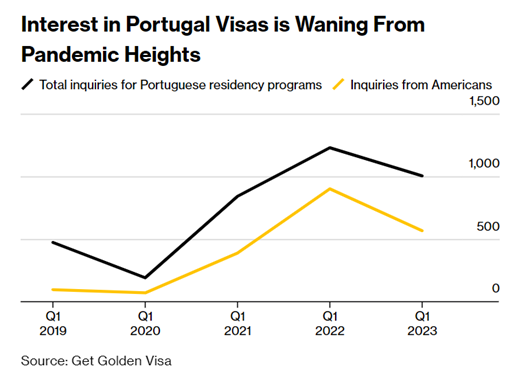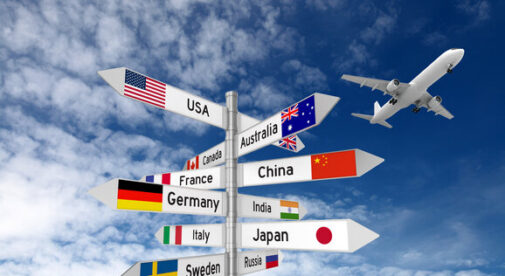Is the era of globalization over? Many people have been asking that question recently.
The last few years have been chaotic. First came the world’s pointless attempt to contain the COVID pandemic by shutting down borders. This happened after tensions between the world’s two biggest economies, China and the United States, had been ratcheting up for several years. Then came Russia’s invasion of Ukraine, leading to leading to disruptions in global finance and commodity trades.
Beyond this big-picture stuff, however, globalization has been showing signs of wear and tear at a more personal level.
Earlier this year, Ireland and Portugal announced major changes to their famous Golden Visa programs. Ireland’s excuse was that a spike in applications had overwhelmed their ability to process them. Portugal is threatening to end its residential golden visa program because foreigners are snapping up so much residential property—precisely what the program was designed to do—that locals can’t afford a place to live.
After the Portuguese announcement, U.S. applications for its Golden Visas dropped by nearly 40%:

Some of this is a natural reaction to the end of pandemic restrictions. As the chart above shows, interest in Portuguese golden visas has fallen off since its peak but is still far above pre-pandemic levels.
But other threads of the global migration tapestry are also unravelling—including one of the most famous migration facilities in the modern world.
Last week, the Israeli Knesset approved a bill tightening rules governing the country’s famous Law of Return. That statute, passed in the early 50s, allows any person considered Jewish—under the state’s definition—to obtain immediate Israeli citizenship on arrival in the country.
Under the new rules, the Interior Ministry may refuse to issue a passport if the returnee doesn’t show a “real connection” to Israel. Pressure for the change came from-right wing religious parties—who have a stricter definition of Jewishness—concerned at the number of Russian and Ukrainian immigrants showing up at the country’s airports after Russia’s invasion in February last year.
The common thread in all these developments is the sheer success of programs designed to encourage personal global diversification. Such programs have either served their purpose, as in Portugal, or have collided with geopolitical events like the U.S.-China conflict and the Russian invasion.
In my view, this is a natural development… and doesn’t mean the end of opportunities for personal global diversification through foreign residency and citizenships. Such programs are simply becoming more discerning.
Portugal’s Digital Nomad visa, for example, continues to be popular. The program, introduced last October, allows non-EU remote workers earning at least €2,800 a month to live in the country for up to five years. Portugal issued 930 such visas in the last six months, with Americans receiving the most (including my colleague Jeff Opdyke).
Eleven EU member states continue to offer various types of long-term residency visas, all of which potentially lead to a second passport through naturalization.
This is a healthy development. In the immediate aftermath of the global financial crisis of 2008-2009, many countries rushed to attract cash-rich foreigners to boost their economies and property markets. As those pressures have receded, individual countries and regional bodies like the European Union have become more discerning, seeking people with a genuine reason to want to live in a country, not just those looking to escape their home environment.
Global doors are still open to people who fit that bill. But the emerging paradigm will be based on more than just cash. Applicants will have to prove suitability under broader, more subjective criteria.
With that in mind, International Living’s publisher has agreed to let me launch a new service aimed squarely at people like that. I’m going to offer real, practical options and actionable solutions, going well beyond the typical “buy a passport from a Caribbean island” fare.
As a dual citizen myself, I can to tell you that it’s one of the greatest assets anyone can have. And I’d like to share it with you!
 Ted Baumann is International Living’s Chief Global Diversification Expert. He’s traveled to nearly 90 countries and is a dual citizen of the United States and South Africa. Ted has been published in international research journals, as well as in media outlets such as Barrons, Forbes, and Cheddar. Learn more about Ted Baumann here.
Ted Baumann is International Living’s Chief Global Diversification Expert. He’s traveled to nearly 90 countries and is a dual citizen of the United States and South Africa. Ted has been published in international research journals, as well as in media outlets such as Barrons, Forbes, and Cheddar. Learn more about Ted Baumann here.

How to Get a Second Passport: The World’s Most Valuable Document Right Now
Learn more about the best ways to boost your income and protect your wealth in our daily e-letter Field Notes with Jeff Opdyke.
• Valuable second passport—U.S. passport not affected
• The 21 passports you could be entitled to right now (including 11 European passports)
• A useful key to unlock closed and locked down travel borders
Claim your FREE report + video to learn more
Related Articles
When It Comes To Mobility, You Are Your Country
Second Passports Aren’t Just For The Rich
The Portuguese Golden Visa Saga Continues
Upcoming Conferences
The Only 2024 Fast Track Panama Conference
If your dream retirement involves stunning beaches… lush green mountains… a warm climate with no hurricanes… first-rate healthcare… incredible value for money (a couple can live well on $2,200 a month)… and the World’s #1 Retiree Discount Program…
Join our Panama experts and expats in February and discover why Panama could be your perfect paradise.



.png)